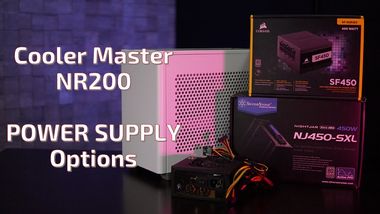Computer Power Supplies
A Power Supply Unit (PSU) is the component that provides the right power to all the components in the PC. Historically PC components required a variety of voltages including at least 12v, 5v and 3.3v. Over the years as the components evolve the power requirements have continuously changed prompting hardware manufacturers to continue developing new and innovative power supplies to the meet the current market requirements.
Choosing a power supply for your build requires an evaluation of the form factor (physical size/shape), capacity (available watts of power) and perhaps power supply ratings (a measure of efficiency/quality).
Power Supply Form Factors
Computer Power Supplies come in a variety of physical shapes and sizes to suite vast array of computer hardware and cases on the market today. Common standards include ATX, SFX, and SFX-L.
Power Supply Capacity
The capacity of a power supply is typically expressed in overall watts of power it can provide. This number can range anywhere from perhaps 150W to 1200W+.
- Anything in the range of 150W to 350W is considered low power in this day an age and won’t be common for anyone building their own PC. That range would be reserved for low end commodity workstations that likely have no GPU or a lower end GPU.
- 400W-600W is probably the most common for the majority of workstations and can typically handle 1 average CPU and 1 average GPU and at most 1 or 2 hard drives.
- 600W-1200W+ is the range many enthusiasts will look to for custom built PC builds. The enthusiasts who enjoy building their own PCs with hand selected parts typically choose higher end components. If you have a higher end CPU or GPU, multiple CPUs or GPUs, and/or a larger number of accessories including harddrivs, then naturally the PC is going to draw more power to feed all those components.
Power Supply Ratings
Power supplies are typically rated as 80+ Bronze, Silver, Gold or Platinum. This rating is an indication of the efficiency of the power supply and a reflection of the quality of the components inside. Often a business using commodity workstations for office users won’t care about the rating of their power supplies. However, an enthusiast building a premium PC they can be proud of often wants to level up a bit with a more efficient and higher quality power supply.
Increased efficiency and quality will results in less heat output per watt of power consumed which may contribute to reducing the overall temperatues in a high end PC build that could be generating a lot of heat. With less heat produced by the power supply, the powersupply’s cooling requirements may also be reduced resulting in a slower RPM fan speed and lower overall noise. Noise reduction is another good reason to choose a higher power supply rating such as Gold or Platinum+.
